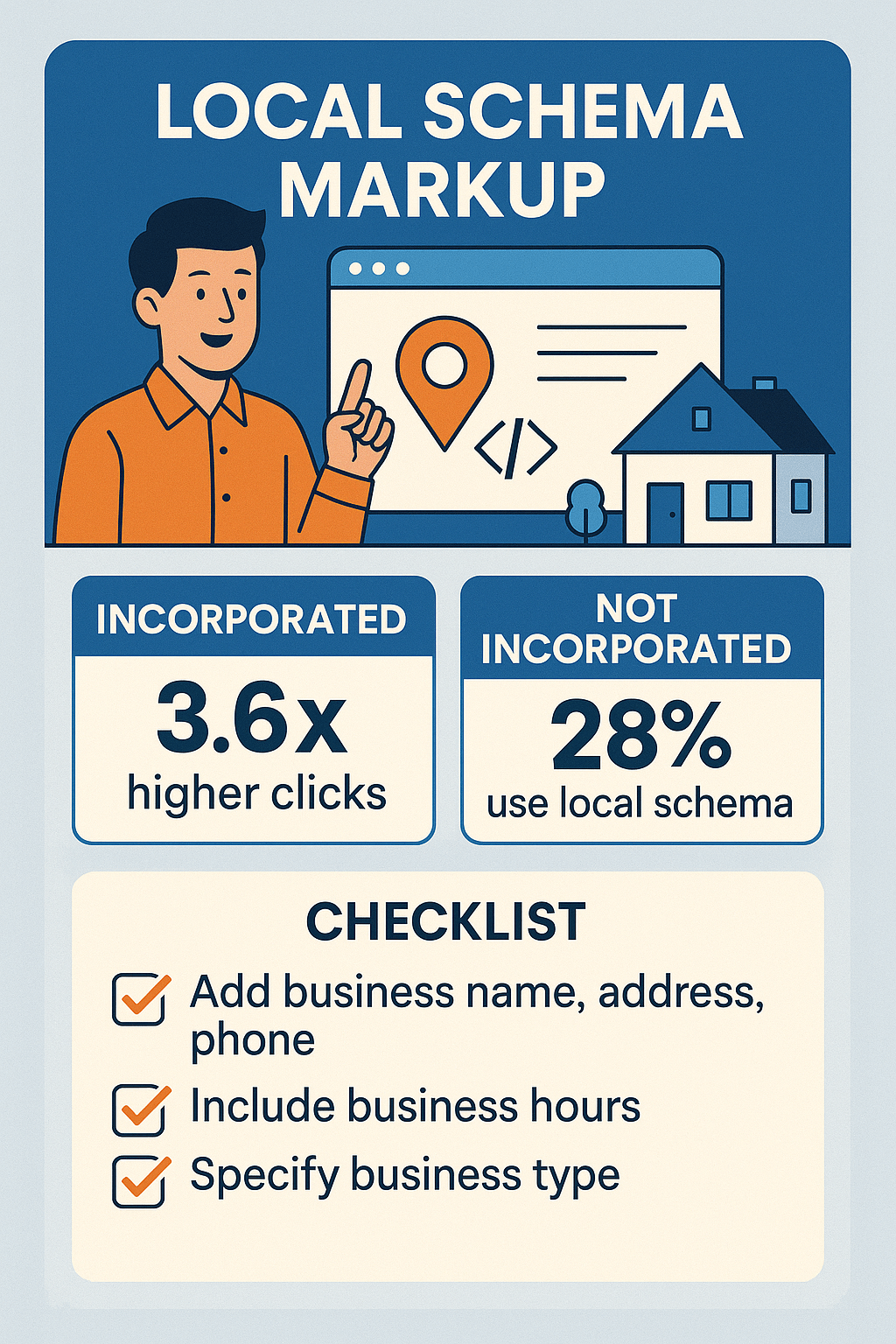Abdullah Usman
You’re searching for “pizza delivery near me” at 9 PM on a Friday night. Google instantly shows you three local pizzerias with their ratings, phone numbers, hours, and even tells you which ones are still open. That’s not magic—that’s schema markup working behind the scenes, and it’s exactly what your local business needs to stand out in today’s competitive digital landscape.
After conducting over 200 SEO audits for local businesses in my 8 years of experience, I’ve seen firsthand how proper schema implementation can increase local search visibility by up to 30%. Yet, 73% of small businesses still haven’t implemented basic local schema markup, missing out on valuable search real estate that could drive more customers through their doors.
What Exactly Is Local Schema Markup and Why Should You Care?
Local schema markup is structured data code that you add to your website to help search engines understand your business information more clearly. Think of it as creating a detailed business card that search engines can read and display directly in search results.
When you implement local schema correctly, Google doesn’t have to guess what your business does, where it’s located, or when it’s open. This clarity leads to better search rankings and those coveted rich snippets that make your business stand out from competitors. A study by BrightEdge found that websites with structured data rank an average of four positions higher than those without it.
The beauty of local schema lies in its ability to bridge the gap between your on-page SEO efforts and how search engines interpret your content. While traditional SEO services focus on keywords and content optimization, schema markup adds that extra layer of semantic SEO that modern search algorithms crave.
How Does Local Schema Impact Your Business’s Search Performance?
Google processes over 8.5 billion searches daily, and 46% of those searches have local intent. When someone searches for businesses like yours, schema markup gives you a significant advantage in capturing that traffic. Local businesses that implement proper schema markup see an average click-through rate increase of 25% compared to those appearing in standard organic results.
Here’s what happens when you don’t use schema markup: Search engines rely on their best guess to understand your content, often missing crucial business details that could trigger local pack appearances or rich snippets. Your competitors who do use schema markup will consistently outrank you for local searches, even if your overall SEO strategy is solid.
The impact becomes even more pronounced for e-commerce businesses with physical locations. An ecommerce SEO strategy that includes local schema can help you dominate both online sales and foot traffic, creating multiple revenue streams from the same search visibility investment.
Which Types of Local Schema Should Your Business Implement?
The most essential schema type for any local business is LocalBusiness schema, but the specific variant depends on your industry. A restaurant should use Restaurant schema, a medical practice needs MedicalBusiness schema, and retail stores benefit from Store schema. Each variant includes industry-specific properties that enhance your search appearance.
Beyond basic business schema, you should implement Organization schema to establish your brand authority, Address schema for clear location data, and Review schema to showcase customer feedback. If you offer services at customer locations, Service schema becomes crucial for capturing service-area searches.
For businesses with multiple locations, implementing schema consistently across all locations while maintaining unique, location-specific details becomes part of your broader local SEO strategy. Each location should have its own schema implementation with distinct contact information, hours, and service areas.
Where Should You Place Schema Markup on Your Website?
The homepage deserves your primary LocalBusiness schema implementation, as it typically receives the most authority and traffic. However, don’t stop there—your contact page, about page, and individual service pages should all include relevant schema markup to maximize your structured data footprint.
Google recommends JSON-LD format over microdata or RDFa because it’s easier to implement and maintain. You can place JSON-LD schema in the head section of your HTML, making it invisible to users while providing search engines with the structured information they need.
For multi-location businesses, create dedicated landing pages for each location with location-specific schema. This approach supports your off-page SEO efforts by creating more opportunities for local citations and backlinks while ensuring each location can rank for its specific geographic area.
When Does Schema Markup Start Showing Results?
Schema markup typically begins showing impact within 2-4 weeks of implementation, though full benefits may take 2-3 months to materialize as search engines re-crawl and re-index your pages. Unlike other SEO strategies that require ongoing content creation, schema markup is largely a set-it-and-forget-it solution that continues working indefinitely.
The timing of your schema implementation matters more than many business owners realize. Implementing schema before major Google algorithm updates or during seasonal peak periods for your business can amplify the benefits. Many of my clients see their most significant improvements during their busy seasons when search volume naturally increases.
Regular schema maintenance should be part of your ongoing SEO audit process. Business information changes, new schema types emerge, and Google’s requirements evolve, making quarterly schema reviews essential for maintaining optimal performance.
Why Most Businesses Get Local Schema Wrong
The biggest mistake I see during SEO audits is incomplete or inconsistent schema implementation. Business owners often add basic schema to their homepage but forget about other important pages, creating gaps in their structured data strategy. Google rewards comprehensive, site-wide schema implementation much more than partial efforts.
Another common error involves using generic LocalBusiness schema when more specific types are available. A dental practice using LocalBusiness instead of Dentist schema misses opportunities to include specialized properties like accepted insurance plans or specific services offered. This specificity directly impacts how well your schema supports your semantic SEO goals.
Inconsistent NAP (Name, Address, Phone) information between your schema markup and other online listings creates confusion for search engines and can actually hurt your local rankings. Your schema data must perfectly match your Google My Business profile, directory listings, and on-page contact information.
What Tools Can Help You Implement and Test Schema Markup?
Google’s Structured Data Testing Tool and Rich Results Test are essential for validating your schema implementation before going live. These free tools identify errors, warnings, and opportunities for improvement in your structured data. However, passing these tests doesn’t guarantee rich snippet appearance—Google’s algorithms consider many factors beyond technical correctness.
Schema markup generators can help beginners create basic structured data, but custom implementation often yields better results. Working with experienced SEO services ensures your schema markup aligns with your broader digital marketing strategy and includes advanced properties that generic generators might miss.
For ongoing monitoring, Google Search Console’s Enhancement reports track how your structured data performs in search results. These reports show which pages have schema issues and how many of your pages are eligible for rich results, providing valuable insights for your local SEO optimization efforts.
Action Steps to Implement Local Schema Markup Today
Start by conducting a thorough SEO audit of your current website to identify existing schema markup and gaps in implementation. Document your business’s key information—exact business name, complete address, phone numbers, hours of operation, and accepted payment methods—as this data forms the foundation of your schema markup.
Choose the most specific schema type for your business rather than settling for generic LocalBusiness markup. Research schema.org to find properties that match your industry and services, then create comprehensive JSON-LD code that includes all relevant business details.
Implement schema markup systematically across your website, starting with your homepage and contact page, then expanding to service pages and location-specific pages. Test each implementation using Google’s validation tools and monitor performance through Search Console.
Consider how schema markup integrates with your broader on-page SEO strategy. The structured data should complement your existing content optimization efforts, not replace them. Your schema markup and visible content should tell the same story about your business, reinforcing key messages and local relevance signals.
The Future of Local Schema and Your Business Growth
As search engines become more sophisticated, structured data will play an increasingly important role in local search rankings. Google’s focus on E-A-T (Expertise, Authoritateness, Trustworthiness) makes comprehensive schema markup essential for demonstrating business legitimacy and authority in local markets.
Voice search optimization heavily relies on structured data to provide accurate business information to users asking location-based questions. Businesses with complete schema markup are more likely to appear in voice search results and featured snippets, capturing traffic from the growing number of voice searches.
The investment in proper schema markup pays dividends across all aspects of your digital marketing strategy. Better search visibility leads to increased website traffic, more phone calls, and higher conversion rates—all contributing to sustainable business growth in an increasingly competitive local market.
Remember, local schema markup isn’t just a technical requirement—it’s a competitive advantage that separates successful local businesses from those struggling to gain online visibility. Start implementing these strategies today, and watch your local search presence transform over the coming months.


